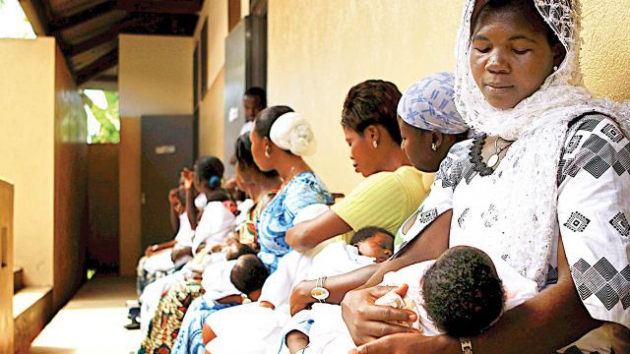Why no woman should die giving birth

Lazarus Moses, 40, and a father of three lost his wife during childbirth at a government hospital in Abuja.
His late wife, Sarah, was a nurse at the hospital where she died. She couldn’t get the hospital to provide care for her at the time she needed it the most.
When Daily Trust visited Moses’ residence at Lugbe, Abuja, grief was written all over him.
“She bled to death after giving birth. My wife is dead. I don’t know how to explain to my children that their mother is gone,” he said.
He said he was excited while waiting for the arrival of the next family member only for his world to come crashing down when a doctor moved up to him and informed him that his wife died but the baby survived.
Moses’ ordeal, however, did not end with the death of his wife as the newborn died from complications five days after.
The story of Mrs Moses and the baby, is one of the several maternal and infant mortality cases in Nigeria.
Dr Tunde Olatoye, a gynaecologist at Ifako Ijaiye General Hospital, Lagos said death from pregnancy could be as a result of infection, post-partum haemorrhage (bleeding after delivery), hypertension, septic shock and amniotic-fluid embolism, among others.
According to him, the factors responsible for maternal death include poor healthcare facilities, poverty, poor access to primary healthcare services and shortage of health care personnel to mention a few.
He said: “Religious and cultural beliefs prevent pregnant women from making healthy choices during pregnancy. Some women have to take permission from their pastors before they visit the hospital, it is that bad.”
He said while maternal mortality is on the rise, government is trying hard to reduce it, adding that the situation seems worse in the northern states.
He said to salvage the situation, the girl child should be educated, adding “so that she can be independent financially and make sound decisions regarding her health. Family planning will also help bring down the indices of maternal death in Nigeria.”
Medical experts said that the cause of death vary from woman to woman. Some result from infection, hypertension, septic shock and amniotic-fluid embolism, a complication in which amniotic fluid or other matter re-enter the mother’s bloodstream, triggering a reaction that can result in cardio respiratory arrest and haemorrhaging.
Postpartum haemorrhage (PPH) was the reason why Moses’ wife didn’t make it out of the hospital.
“The medical personnel neglected her while focusing on my baby,” Moses lamented.
PPH occurs when blood loss is more than 500 mililitres, following vaginal delivery or more than 1,000 mililitres, following cesarean delivery.
Experts suggest that PPH should be diagnosed with any amount of blood loss that threatens the hemodynamic stability of the woman.
Investigations show that most maternal deaths in Nigeria occur as a result of poor access to maternity services and pre-natal and post-natal care, insufficient supplies and trained personnel, lack of facilities for emergency transport, lack or poor referral services and inadequate medical treatment of complications.
Some socio-economic factors which border on poverty, illiteracy, malnutrition and low social status of women, religious misconceptions and harmful traditional practices also contribute to rising cases of maternal mortality.
Hajiya Habiba Mohammed Damina, the health coordinator of the Federation of Muslim Women Association of Nigeria (FOMWAN), Bauchi State chapter, said women’s challenges during pregnancy are poor access to modern health facilities, cost, illiteracy and negligence on the part of health personnel.
“When women visit hospital and are presented with a bill that outweighs their budget and/or they are not properly taken care of by healthcare givers, they decide to stay at home, not minding the consequence,”she said.
The Executive Secretary of the FCT Primary Healthcare Development Board (NPHDB), Dr Rilwanu Mohammed, said maternal and child mortality which are yardsticks to measuring the progress of a society is unacceptably high in Nigeria.
“The health policy of the Federal Government of Nigeria is based on primary healthcare but the issue of health is on the concurrent list. The teaching hospitals and federal medical centres are under the federal government; general hospitals are under the states and FCT while the primary healthcare centres, which serve the masses, are under the local governments, which lack the capacity to manage them,” he said.
He added, however that the government is making effort to tackle the challenges.
“We are building more primary healthcare centres in Nigeria. We’ll equip them, recruit medical personnel and have good water and power supply there,” he said.
Hajiya Fatima Bello, a retired nurse from Sokoto, said until women are put in their rightful place in line with Islam, it will be difficult to address maternal mortality, especially in the North.
“We still depend on our men to make decisions concerning our health,” she said. “For example, when a woman is pregnant, she can’t go to hospital without her husband’s or in-law’s permission. So, if he is angry with his wife, he may decide to ignore her. But in Islam, women have rights and we must be allowed to exercise our rights,” she said.
Read more at http://www.dailytrust.com.ng/news/health/why-no-woman-should-die-giving-...












